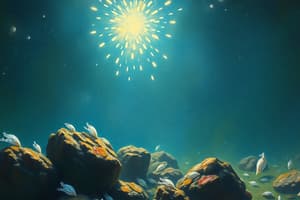Podcast
Questions and Answers
What does marine biology study?
What does marine biology study?
Marine biology studies the organisms that inhabit the sea, their interrelationships, and their interactions with their environment.
Why is basic knowledge of marine biology necessary to understand how marine organisms relate to us and the marine environment?
Why is basic knowledge of marine biology necessary to understand how marine organisms relate to us and the marine environment?
Basic knowledge of marine biology is necessary to understand how marine organisms relate to us and the marine environment.
What does oceanography study?
What does oceanography study?
Oceanography studies the oceans and their phenomena, such as waves, currents, and tides.
What are some different fields of study within oceanography?
What are some different fields of study within oceanography?
What is the difference between oceanography and marine biology?
What is the difference between oceanography and marine biology?
Marine biology ONLY studies the physical elements of the ocean.
Marine biology ONLY studies the physical elements of the ocean.
Oceanography studies the inhabitants of the ocean.
Oceanography studies the inhabitants of the ocean.
Flashcards
Marine Biology
Marine Biology
The study of organisms that inhabit the sea and their interactions.
Oceanography
Oceanography
The study of oceans’ physical phenomena like waves and currents.
Difference: Oceanography vs Marine Biology
Difference: Oceanography vs Marine Biology
Marine biology studies organisms; oceanography studies ocean features.
Shark Size Fact
Shark Size Fact
Signup and view all the flashcards
Shark Attacks
Shark Attacks
Signup and view all the flashcards
Marine Invertebrate Uses
Marine Invertebrate Uses
Signup and view all the flashcards
Coral Reefs
Coral Reefs
Signup and view all the flashcards
Mangroves
Mangroves
Signup and view all the flashcards
Fish as Food
Fish as Food
Signup and view all the flashcards
Overfishing
Overfishing
Signup and view all the flashcards
Marine Biodiversity
Marine Biodiversity
Signup and view all the flashcards
Ocean Pollution
Ocean Pollution
Signup and view all the flashcards
Biomagnification
Biomagnification
Signup and view all the flashcards
Industrial Chemicals
Industrial Chemicals
Signup and view all the flashcards
Sustainable Fishing
Sustainable Fishing
Signup and view all the flashcards
Medicinal Seaweeds
Medicinal Seaweeds
Signup and view all the flashcards
Importance of Marine Biodiversity
Importance of Marine Biodiversity
Signup and view all the flashcards
CO2 Absorption
CO2 Absorption
Signup and view all the flashcards
Coral Reefs' Role
Coral Reefs' Role
Signup and view all the flashcards
Human Impact on Oceans
Human Impact on Oceans
Signup and view all the flashcards
Pharmaceuticals from Ocean
Pharmaceuticals from Ocean
Signup and view all the flashcards
Animal Communication
Animal Communication
Signup and view all the flashcards
Tides
Tides
Signup and view all the flashcards
Oceans and Weather
Oceans and Weather
Signup and view all the flashcards
Ecosystem Services
Ecosystem Services
Signup and view all the flashcards
Aquaculture
Aquaculture
Signup and view all the flashcards
Endangered Species
Endangered Species
Signup and view all the flashcards
Wave Energy
Wave Energy
Signup and view all the flashcards
Importance of Coral
Importance of Coral
Signup and view all the flashcards
Study Notes
Oceanography/Marine Biology
- Oceanography is a science that encompasses various phenomena, including ocean currents, waves, and tides.
- It utilizes fields such as physics, geology, and chemistry.
Marine Biology
- Studies marine organisms and their interactions with the environment.
- Basic knowledge of marine organisms is necessary to understand how human activities affect the marine environment.
- It explores how marine organisms interact with their environment.
Studying That Suits You
Use AI to generate personalized quizzes and flashcards to suit your learning preferences.




